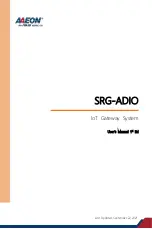
QuadroM 32x/8L/26x/12Li/26xi Manual II: Administrator's Guide
Administrator’s Menus
QuadroM 32x/8L/26x/12Li/26xi; (SW Version 5.2.x)
77
Agent Group (AG) is actually a Quadro extension with enhanced capabilities. The type of that extension in Quadro configuration is
ACD Group
(see
ACD Group Extension Settings
). Except for regular attributes intrinsic to extension (like extension number, SIP user name, etc.), it is characterized
also by the collection of agents included into that group, call queue and the call distribution mechanism. These agent group specific parameters of
extension are being configured from
ACD Group Settings
or
ACD Agents Table
accessible from
ACD Group Extension Settings
.
Call Queue of Agent Group
Agent Group receives the calls from customers via means existing currently on Quadro. For example, it may receive the direct call through ITSP on
SIP number (DID number) assigned to AG, receive a call through ACD’s IVR on AG’s extension number, external call through
Call Routing
table on
Quadro, etc.
Arrived call is being added to the end of the AG queue if there are no available (online) agents to answer the call immediately. For connecting to the
agents always the call at the top of the queue is being selected. The call queue settings are configured from the
ACD Group Settings
(see
ACD
Group Extension Settings
).
Each agent can have of the following states: online, offline, away, busy or DND (Do not Disturb) (for details see
ACD Agents Table
accessible from
ACD Group Extension Settings
). If the same agent is logged into different agent groups, he/she may have different states in different groups except
for DND status. If the agent has DND state in some group then his state will be the same for all other groups.
The state of the agent can be updated either by administrator from the
ACD Agents Table
(with the exception of “DND” and “busy” states) or by
agent from the handset (except for “busy” state). The agent, for changing the state to “online”, “offline”, “away” from the handset needs to call the
predefined Auto Attendant (see
Attendant Extension
Settings) and on attendant’s prompt enter the agent ID, password and the status code. The state changes from “online” to
“busy” or vice versa automatically when the agent starts or finishes conversation.
Calculation of Composite Skill Grade
Usually, before the call arrives to the agent group, it is first answered by ACD specific IVR. The main function of IVR is follows: via short questions to
calling customer determine the set of skills required from the agent for best serving the customer. On IVR’s questions, the customer answers by
phone keystrokes (DTMF digits), each keystroke corresponding to some required skill. After finishing the quiz, IVR routs the call to AG along with
information about the required skills set.
To calculate the agent’s composite skill grade, AG sums up the grades of those skills of the agent that are included into the required skill set received
from IVR. The grades of the non required skills are not considered.
The composite skill grade of AG is the sum of composite grades of the online agents of that group.
Interactive Voice Response system
ACD IVR is a custom Auto Attendant (see
Attendant Extension Settings) configured on Quadro with VoXML script and voice prompts designed for quizzing the customers, determining the set
of required skills as described above and routing the call to the agent group having the maximum current value of the composite skill grade for
required set. Since the general skill set is configured by ACD administrator and is application specific (call center specific), the VoXML script and
voice prompts of IVR should be built taking into account the skill set configured by administrator.
ACD IVR is needed mainly in case if there are Agent Groups that are configured to do skills based call distribution between agents. In such
circumstances the IVR is quizzing the calling customer to determine the set of required skills and when handing over the call to ACD module it
passes the set of skills required by calling customer. Having that set the ACD module calculated the composite skill grade of each AG in the system
and sends the call to AG having the highest value of composite skill grade. The call in AG is handled according to call distribution type configured
with that AG.
For example, if the call distribution type of AG is “skills based” then AG will try to connect the call to the agent having the highest composite skill
grade and if it is not answered within timeout the AG will try to connect to the next agent with the highest grade, etc. If the call distribution type is
something else then AG will distribute the calls according to that distribution type don’t taking into account the skill grades of the agents.
In case if the call is received on agent group bypassing ACD’s IVR and the skills based call distribution is selected for that agent group, the agent
group will consider the full set of skills when making decision on which agent to make a call first. In other words, since there is no required set of
skills received from IVR, then the agent group will consider the full set of skills summing up all skill grades of agent.
To simplest way to build the VoXML script for IVR is using the text of the Epygi’s sample VoXML script modify that and customize for your
application. The IVR voice prompts should be recorded and uploaded as usual.
The
ACD Management
page consists of 3 sub-pages:
Skills
,
Agents
and
Groups
.
The
Skills
page contains a list of all available skills and
their descriptions. The skills defined in this page are then
used in the agent management (see above) to assign the
skill level to the agents.
Add
opens the
Add Skill
page where a new skill may be
defined. The
Add Skill
page contains the
Skill
text field to
define the skill name and an optional
Description
field for
the description of the skill.
Fig. II-133: ACD Management - Skills page
















































